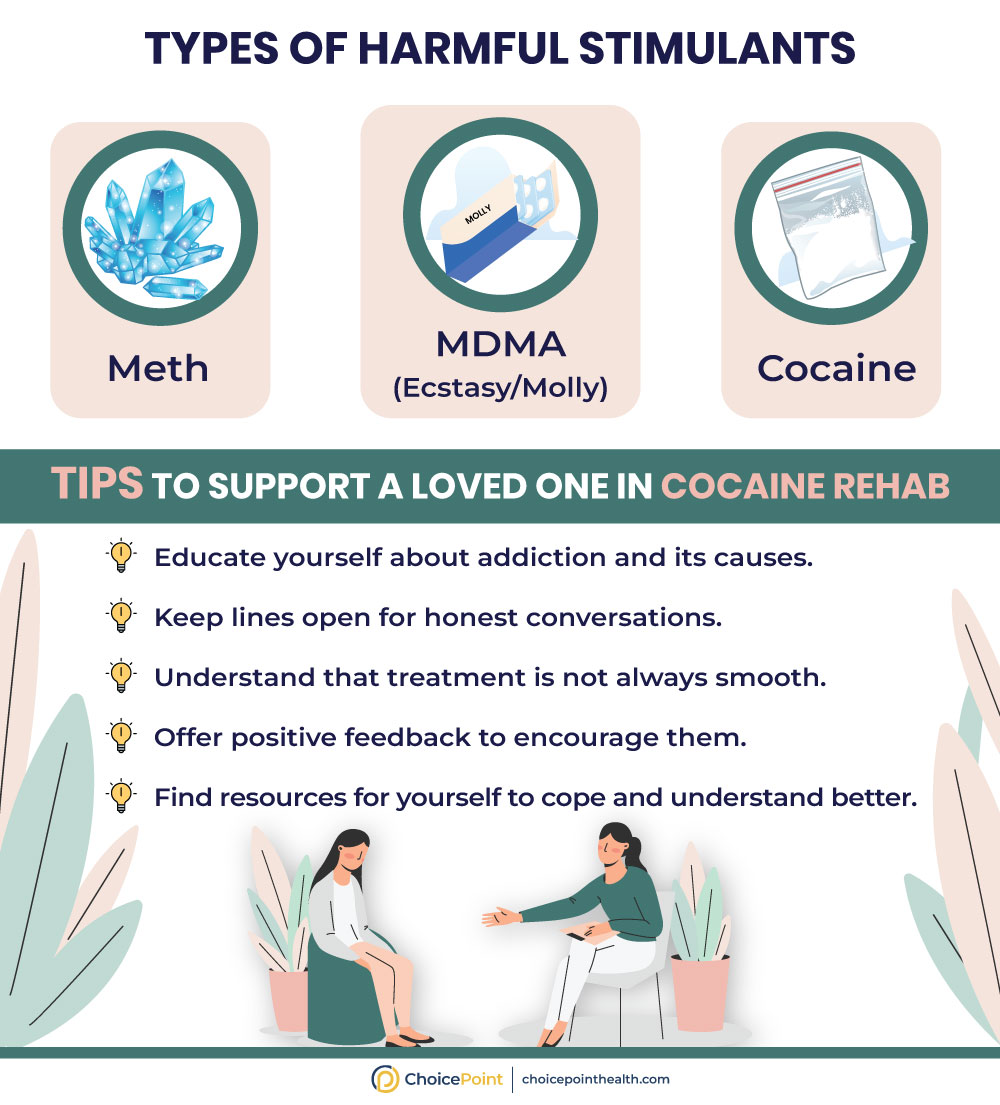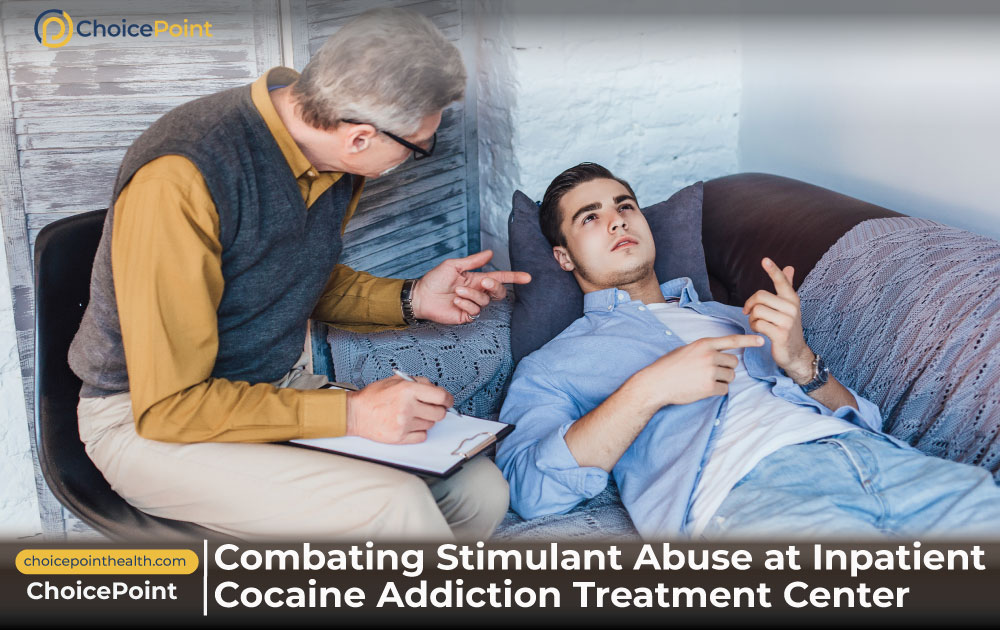Abuse of psychostimulants like cocaine and meth increased drastically in the recent decades. Cocaine use increased by 22%, and stimulant abuse overall elevated by 33% from 2020 to 2021. Stimulants harm a person in more than one way. While it deteriorates physical health, it is they are also a significant cause of mental health issues. What makes psychostimulants challenging to overcome are the severe withdrawal symptoms, such as psychosis, delusions, hallucinations, etc. An inpatient cocaine addiction treatment is a haven for those who struggle with stimulant use disorder as it provides a trigger-free environment with around-the-clock professional medical care.
Table of Contents
Understanding Psychostimulants Like Cocaine
Psychostimulants, also referred to as stimulants, broadly include illicit drugs like cocaine or methamphetamine as well as therapeutic drugs like Adderall, Ritalin, etc. Stimulants are responsible for increasing activity in the brain, making individuals feel more attentive, concentrated, and energetic.
Stimulants are used to treat conditions like ADHD or sleep disorders. However, whether prescription or illicit, the level of stimulant abuse remains high in the country. Cocaine and meth are one of the top killers.
If you or your loved one seems to exhibit signs of cocaine abuse, save your life by calling us at 844.445.2563 or filling out this form.
Necessity of Support from Inpatient Cocaine Rehab
One of the best ways to overcome stimulant use disorders like cocaine is to seek support from an inpatient facility. An organized structure like inpatient rehab provides the opportunity to seek top-notch help available all the time. Inpatient care for cocaine abuse helps because:
- Withdrawal symptoms are severe
- Going cold turkey is extremely painful
- Mental and behavioral symptoms are worse than physical ones
- There is always the risk of heart failure, self-harming thoughts, and seizures
While cocaine withdrawal may not be directly life-threatening like other hard drugs like opioids, it is nearly impossible to deal with the intensity of emotional and mental turmoil on your own.

Did you know? 20% of college students are seen to abuse prescription stimulants for academic and recreational purposes.

Did you know? 20% of college students are seen to abuse prescription stimulants for academic and recreational purposes.
a. Provides Trigger-free Environment
Withdrawal can make individuals very vulnerable and miserable. If the environment is not ideal, the chance of relapsing increases. Inpatient rehab is ideal for Cocaine use disorder treatment as it keeps the patient within the confines of the hospital while:
- Stabilizing the patient’s condition
- Providing them with amenities
- Nursing them 24/7
- No drugs or other triggers are available
Without the presence of triggers that can move the patient to turn to drugs, treatment becomes highly efficacious, especially for illicit drugs like cocaine or meth.
b. Structured Scheduling
One can be reckless towards themselves in terms of eating properly or taking medications when entirely on their own. In an inpatient setting, patients are provided everything in time. Due to proper scheduling, treatment can go seamlessly.
c. Supervision and Evaluation
Practitioners supervise a patient’s condition and evaluate the treatment’s effectiveness. This allows them to understand whether the treatment works well for the patients. Patients may also seem encouraged to observe the progress day by day. Rather than thrusting the patients into the real world, inpatient rehab allows them to equip themselves before facing challenges.
Combating Addiction with Stimulant Abuse Treatments
There are many treatments offered at an inpatient cocaine addiction treatment center to combat stimulant use disorder.
a. Detox as Effective Inpatient Cocaine Addiction Treatment
Medical detox is a way to eliminate toxins accumulated in the body as a result of drug abuse. Detox mainly happens in the liver, the organ responsible for providing clean blood to the body and for overall mechanism. Here’s why detox is important:
- Preps the body for other interventions
- Rids the liver of unnecessary toxins
- Reduces withdrawal symptoms
Detox is generally the first step carried out in an inpatient rehab center. While detox can be performed in outpatient settings, cocaine, and other stimulants may require you to stay in an inpatient facility.
b. Psychotherapies: Important Stimulant Abuse Treatment
A range of psychotherapeutic interventions are incorporated as part of a comprehensive treatment. Often, therapies and detox are the two treatments available for people who have stimulant use disorders. Therapies like CBT have shown promising results for people with cocaine use disorder during clinical trials. Options available for patients are:
- Cognitive-behavioral Therapy
- Dialectical Behavioral Therapy
- Family Therapy
- Group Therapy
- Individual Therapy
These are implemented according to the needs of the patients and after the practitioner has made their assessment.
Here is a guide on the cocaine addiction hotline, which is a valuable tool. If you want to contact a professional, call us at 844.445.2563 or fill in your information in this form.
c. Cocaine Medications as Treatment
Currently, there are no FDA-approved medications to treat stimulant abuse. However, the practitioners may recommend some medications to soothe some withdrawal symptoms. Some medications that have shown promising results in clinical trials (but are not yet approved) include dopamine agonists, such as long-acting amphetamine and modafinil, or glutamatergic and topiramate.

How to Help Someone Who is Misusing Stimulants
Inpatient Cocaine Addiction Treatment in NJ
After dispensing top-notch outpatient care, ChoicePoint is also available in NJ for inpatient cocaine addiction treatment and accepting patients from nationwide. From detox and MAT to a diverse range of therapies, we have it all. After a straightforward procedure, you can undergo treatment at our inpatient cocaine addiction treatment in NJ.
Why ChoicePoint?
- We accept most insurance, including Medicare and Medicaid
- Our practitioners and therapists are licensed
- Personalized treatments
- Recovery-promoting environment
- We offer transparency
- Aftercare facilities are available
Our inpatient cocaine addiction treatment center offers treatment for almost all substance abuse disorders.
Call our inpatient cocaine rehab at 844.445.2563 or fill in your information here to book a consultation with our specialist. Verify your insurance here to confirm if your cost will be accommodated.
Questions Typically Asked Regarding Inpatient Cocaine Rehab
Cocaine use disorder is a deadly condition. The following section answers some commonly asked questions to provide a proper guide.
What is Stimulant Use Disorder DSM 5?
According to the DSM, stimulant use disorder is the persistent use of amphetamine-type substances, whether medical or illicit, that impair a person’s physical, mental, or overall health mildly or severely. The drugs may include meth, cocaine, Adderall, etc.
Is Addiction Treatable?
Yes. While there is no cure for addiction, it can be managed through appropriate and timely interventions. These interventions may include medication administration, therapy, or detox, all of which are considered adequate in terms of most substance use disorders.
Why Do Students Abuse Stimulants?
College students tend to abuse stimulants to cope with academic pressure and remain concentrated. It is often seen that students tend to use prescription meds that are not prescribed to them.
What Disorders Are Treated With Stimulants?
Stimulants are used to manage conditions like attention deficit hyperactivity disorder and sleep or eating disorders. However, they should only be taken when prescribed by the doctor. Taking stimulants without proper diagnosis can lead to stimulant dependence, which is always harmful in the long run.
What Is the Street Name for Cocaine?
Cocaine is commonly sold under the slang names of Coke, the Big C, Crack, Line, Speedball, White Rock, Snow, etc. There are several other names used to describe cocaine, depending on the location.
What’s The Difference Between Crack & Cocaine?
A crack is a form of cocaine that is processed to make a rock crystal. It is smoked after melting, while cocaine is a powdered substance that is typically snorted or injected. Crack produces a more intense but shorter-lived high compared to the longer-lasting euphoria of cocaine as powder or injectable.
Medical Disclaimer:
ChoicePoint aims to improve the quality of life for people struggling with substance use disorder and mental health issues. Our team of licensed medical professionals research, edit and review the content before publishing. However, this information is not intended to be a substitute for professional medical advice, diagnosis, or treatment. For medical advice please consult your physicians or ChoicePoint's qualified staff.











Review Combating Stimulant Abuse at Inpatient Cocaine Addiction Treatment Center.